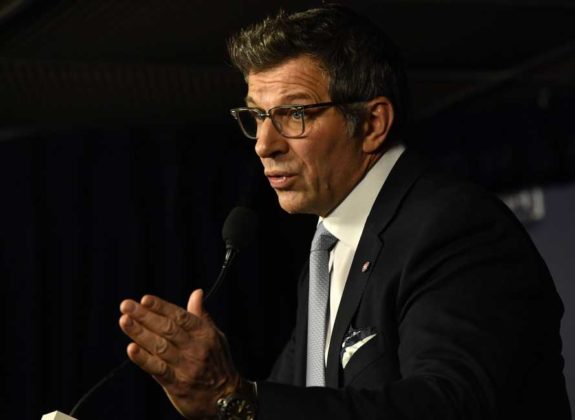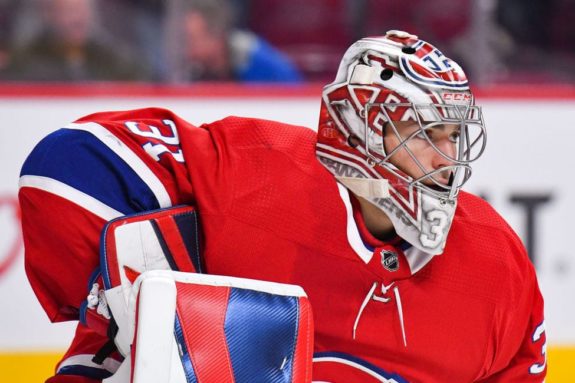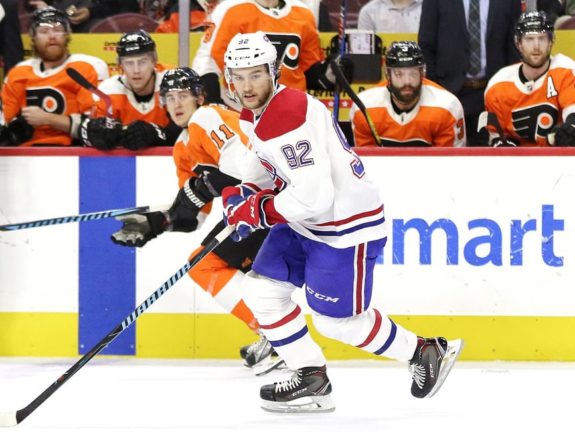It wasn’t just a horrible season for the Montreal Canadiens. From both a professional and personal perspective, there are few worse things than getting it completely wrong. This writer did exactly that, making simply disastrous predictions for the 2017-18 Habs season.
Where to start? How about the good.
The One Good Habs Prediction: They’d Be Worse
It’s hard to take credit for arguing the Habs would be worse off than they were in 2016-17. After all, it was downright logical. General manager Marc Bergevin had completely dismantled the team’s left defensive side, star goaltender Carey Price had finished the previous season looking human and the GM had still failed to address the team’s hole at center.

Adding Jonathan Drouin was supposed to bolster the team’s offense, after the Habs had scored just 11 goals in last year’s first round against the New York Rangers. Despite the coup landing the native Quebecer, Bergevin failed to re-sign Alexander Radulov who had been the only consistently impressive Hab during those six games, though.
The end result was a team that finished 29th in league scoring. That’s the one good call I made: “The Habs may actually find themselves in a bigger hole offensively…”
Unfortunately, I finished that sentence with the words “in the playoffs,” going so far as to say the Habs were “undeniably a playoff team.” Talk about your bad predictions.
The Bad: They’d Finish Second
While anyone could see the Habs would be worse, few could have possibly predicted just how bad they’d be. In a worst-case scenario, most realists probably had them battling for a wild-card position and falling just short.
I went the other way, thinking they’d finish behind the Tampa Bay Lightning in the Atlantic Division (at least I had the Lightning at No. 1). The justification was simple. Tampa had a legitimate No. 1 center in Steven Stamkos. The Canadiens didn’t. I obviously failed to consider that Tampa had everything else too.
Even the one supposed given, Price being solid, failed to materialize (.900 save percentage). That’s in addition to the defense falling flat and the offense going missing in action. Aside from a 10-1 rout of the Detroit Red Wings in early December, which was the culmination of a five-game winning streak that all-too temporarily brought the Habs back into a playoff spot, the offense was a joke.

The punchline? In maybe a sign of things to come, Max Pacioretty, who had led the Canadiens in scoring every season since before the 2012 lockout, was the only forward to not tally a single point in that victory.
The Ugly: Pacioretty and Drouin Would Be Dynamite
This was supposed to be the year Pacioretty finally hit 40 goals, with Drouin’s playmaking being the primary catalyst. Ultimately, not only did Drouin’s playmaking fail to negate the loss of puck-movers on the back end as far as Pacioretty’s offense was concerned, it never really became a factor. Like at all.
Pacioretty finished with 17 goals in 64 games, just two more than the 15 he had scored during the lockout-shortened 2012-13 season. He also had two more points overall in 44 games that year. Meanwhile, forced into a round hole at center, the square peg that was Drouin failed to find the hot stick that he had displayed as a member of the Lightning dating back to the 2015-16 playoffs (14 points in 17 games). He did finish with 13 points in his last 14 games, which is something, I guess… namely too late.

While most had anticipated there to be instant chemistry between Drouin and Pacioretty, it was ironically Drouin and Alex Galchenyuk who seemed to be more in sync. What was most ironic is how Galchenyuk seemed to have worn out his welcome in Montreal, especially with Bergevin effectively declaring Drouin the heir to the No. 1 center spot he had lost at the team’s annual golf tournament.
The thought process here was if the Habs intended on giving a player with even less experience at center than Galchenyuk more of a shot there, they were looking to use him as bait to improve at another position. Again, that proved false, as not only did the defense fail to receive much in the way of reinforcements, but, even in a pretty decent season up front for Galchenyuk, the offense still stunk overall.
Keeping Galchenyuk turned out to be one of the few wise decisions Bergevin made. Not that I’m one to talk, obviously.